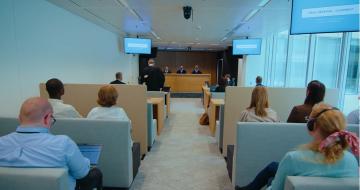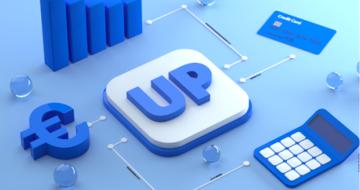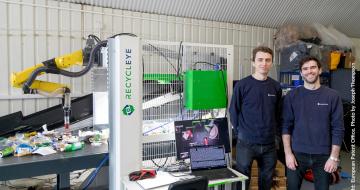Copyright in the digital environment: prefer the legal offer!
Listening to music, watching movies, reading books or newspapers, you can do all this digitally and completely legally. It's simple and easy, with no legal headaches. And various other things are possible too. The digital market is undoubtedly a fact in Belgium. Whether purchasing an e-book, streaming music on your smartphone, reading a newspaper or magazine on your tablet, or ordering a documentary, a film or information on digital TV: everything is legal possible. And often at an advantageous price. These services may even be free, possibly financed with advertising revenue.
Legal online platforms have been around for a while, but today they are more readily available, easily accessible and reliable. In other words, they can be a genuine alternative or complement to the physical market. And the offer continues to grow.
The Council for Intellectual Property thoroughly examined the issue of copyright enforcement on the Internet. You can consult the advise in French or Dutch issued by the Council for Intellectual Property on this subject on this website.
One of the Council's recommendations is that the legal offer should be protected and encouraged. Indeed, the copyright principles that apply in the physical world also apply in the digital world: when you want to listen to music, watch movies, or read books, you must respect the rights of authors and related rights holders. Authors, performers and producers invest a lot of creativity, time and money in their works and performances. They, therefore, deserve respect and an adequate remuneration.
Creating a competitive, sustainable and balanced market for products and services is one of the main tasks of the FPS Economy. Only legal online platforms, which treat rights holders correctly while being competitive enough to attract consumers, can guarantee creativity in a sustainable and balanced way. Out of respect for that creativity, we, therefore, advise you to use these legal platforms.
Keep in mind that copyright also applies on the Internet.
Is what is on the Internet protected?
All works on the Internet are protected by copyright, if they meet the conditions for protection.
Examples are:
- text;
- images;
- computer programs;
- music
- and websites.
This is the case, even if you do not have to pay to access these works or no “copyright” or author name is mentioned.
You must therefore respect all copyright rules for what is on the internet. In addition, you must ask the rightholders for permission to:
- copy a photo;
- download music;
- copy articles;
- to place photos of an internet user on one's own website, etc.
In some cases, the copyright holder may clearly indicate that formal permission is required to copy the work. Then you should check:
- how far this permission extends, and
- and for what type of use it is given (only private use, non-commercial use, educational use, etc.).
These kinds of permissions are often given through models of so-called free licenses or “public domain” licenses.
Do you have to take copyright into account before posting anything on the internet?
Of course. Posting something on the internet implies a communication to the public, for example:
- a photo;
- a drawing;
- music;
- a movie;
- a computer program;
- a game, etc.
If the object you wish to use is protected by copyright, you need the permission of the right holder before placing it on any website (classic websites, blogs, Myspace, Facebook, YouTube, etc.).
Is peer-to-peer (downloading and uploading music, movies, series, etc.) legal?
In any case, it is illegal to make your own files available (upload) via peer-to-peer networks, without the permission of the author or rightholder, in a way that allows them to be downloaded by other internet users. In peer-to-peer networks, however, the aim is almost always that the participants share files that are on their computers.
Those who download themselves must also make their files available to others,
- either due to a technical constraint;
- either because this is (morally) expected of the participants in such networks.
Courts in other countries do not consider the downloading of a music file or a movie as a private copy. It is, therefore, also illegal.
The Court of Justice of the European Union has clarified in a judgment of 10 April 2014 that making a private copy from an unauthorized source is not allowed. An unauthorized source is a source that infringes the rights of the authors or holders of related rights. A copy of a work over a P2P network, even if only for personal use, often constitutes a copy from an unauthorized source and thus is not permitted by law.


